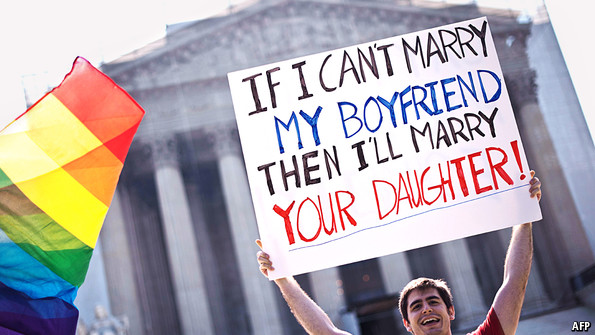The Supreme Court strikes two blows for gay marriage
by Biodun Iginla, BBC News and The Economist

One case, Hollingsworth v Perry, considered Proposition 8, a ballot initiative passed in California in 2008 that defined marriage in that state as a union between one man and one woman. The other, United States v Windsor, concerned the Defence of Marriage Act (DOMA) of 1996, which barred the federal government from recognising gay nuptials. The Obama administration declined to defend DOMA; Californian officials refused to fight a state-court ruling striking down Proposition 8. That left Proposition 8’s defence to its original sponsors, led by Dennis Hollingsworth, a former state senator from San Diego, and DOMA’s to House Republicans.
In a 5-4 ruling, the court found DOMA unconstitutional. The case was brought by Edith Windsor, who married her partner Thea Spyer in 2007, after 44 years together. Though they married in Canada they lived in New York, which allows same-sex marriage. When Ms Spyer died in 2009, she left her estate to Ms Windsor. Had Ms Spyer been Mr Spyer, Ms Windsor would have inherited the lot tax-free. But because DOMA barred the federal taxman from recognising their marriage, Ms Windsor was whacked with $363,053 in estate taxes.
She sued, arguing that DOMA violated fifth-amendment principles of equal protection under the law. The court’s four liberal jurists, along with Anthony Kennedy, the court’s swing voter, agreed. “DOMA seeks to injure the very class New York seeks to protect,” Mr Kennedy wrote, and “a bare congressional desire to harm a politically unpopular class” cannot justify such treatment. The ruling also affirmed that states may define and regulate marriage as they see fit. DOMA, the justices complained, created “two contradictory marriage regimes within the same state” (or as Ruth Bader Ginsburg, a liberal justice, quipped during oral arguments, it created “two kinds of marriage; the full marriage, and then this sort of skim-milk marriage”).
Dissenting, Antonin Scalia chastised the majority for ignoring the will of Congress, though he had been happy to do the same a day earlier, when he voted to invalidate part of the Voting Rights Act, which Congress had re-authorised in 2006 (see article).
The repeal of DOMA means that gay couples in states that recognise their marriages will have equal access to more than 1,100 federal benefits—and burdens—that
In the Proposition 8 case, the court ruled 5-4 that Mr Hollingsworth lacked standing to bring a case. State officials did not defend Proposition 8 when a California district court found it unconstitutional in 2010 and ordered officials not to enforce it. Chief Justice John Roberts, writing for the majority, said that the Supreme Court has “never before upheld the standing of a private party to defend…a state statute when state officials have chosen not to. We decline to do so for the first time here.”
This decision leaves the California court’s ruling in place, which counts as a victory of sorts for gay-rights supporters. It clears the way for same-sex marriage in America’s most populous state.

But that could have provoked a backlash, just as Roe did. The court’s narrow, technical ruling keeps the fight for gay marriage at the state level, where supporters have been winning (see chart). When California’s voters approved Proposition 8 in 2008, gay marriage was legal in just two states: California and Massachusetts. Today it is legal in 13, plus the District of Columbia, with more to come.

Do you need to increase your credit score?
ReplyDeleteDo you intend to upgrade your school grade?
Do you want to hack your cheating spouse Email, whatsapp, Facebook, instagram or any social network?
Do you need any information concerning any database.
Do you need to retrieve deleted files?
Do you need to clear your criminal records or DMV?
Do you want to remove any site or link from any blog?
you should contact this hacker, he is reliable and good at the hack jobs..
contact : cybergoldenhacker at gmail dot com